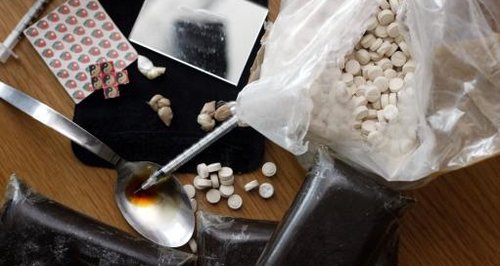On Air Now
Capital Breakfast with Jordan North, Chris Stark and Sian Welby 6am - 10am
21 May 2019, 08:27

More than 500 suspected members of county lines drugs gangs have been arrested in a week.
Capital's been told that there are currently ninety active cases of county line gangs in operation in the West Midlands alone.
The National Crime Agency estimates that there are around 2,000 across the UK, and every police force in England and Wales is affected by their activity.
A man we're calling "Sam" spoke to Capital for the first time about his harrowing time as a victim of cuckooing. His family were threatened as his home was taken over by a county lines drug gang linked to Birmingham.
Three men were sentenced after they were found guilty of conspiracy to supply crack cocaine and heroin between July 2017 and January 2018.
"Sam" told us he was scared to live in his own home:
#WATCH As new #countylines figures are released this morning, we've been speaking exclusively to a victim who had his home taken over by drug dealers with links to #Birmingham
— Capital Brum News (@CapitalBIRNews) May 21, 2019
'Sam' has been telling us his story for the first time #CapitalReports pic.twitter.com/voPoAjH3ku
Between May 13th and 20th 2019 police forces across the UK carried out a crackdown co-ordinated by the National County Lines Coordination Centre, seizing £312,649 in cash and 46 weapons.
In the week long operation:
- 500 men and 86 women were arrested
- 519 vulnerable adults and 364 children were safeguarded
- 30 people were referred as potential victims of slavery or human trafficking
- 46 weapons were seized, including four guns, swords, machetes, an axe, knives, samurai swords, and a crossbow
- drugs including cocaine worth £176,780, crack worth £36,550 and heroin worth £17,950 were seized
National Crime Agency (NCA) County Lines lead Nikki Holland said: "Tackling county lines and the misery it causes is a national law enforcement priority and these results demonstrate the power of a whole-system response to a complex problem that we're seeing in every area of the UK.
"We know that criminal networks use high levels of violence, exploitation and abuse to ensure that vulnerable people they employ do the day-to-day drug supply activity."
Young people and vulnerable adults are "groomed" and forced into a life of crime by members of county lines drug gangs, that courier banned substances from urban centres into more rural areas, taking orders on phone lines.
Ms Holland added: "We are making progress in our fight against County Lines but we need the help of professionals working with people at risk of being involved in or exploited by County Lines.
"It's the nurses, teachers, social workers, GPs, and anyone who works with young or vulnerable people, that can really help to make a difference."
Signs that a young person may have fallen prey to a county lines gang are suddenly having new unaffordable belongings; going missing a lot; having friendships with older people or having unexplained injuries.
The number of cases of modern slavery involving UK minors has DOUBLED from 676 in 2017 to 1,421 in 2018.
***
Independent charity Crimestoppers is highlighting the dangers of ‘County Lines’ and the exploitation of vulnerable people in Ilkeston, with a two month campaign which started last week, to encourage people to be aware of what they can do to keep their community safe.
County Lines is where criminals from major cities such as Birmingham expand their drug networks to other areas, bringing with it serious criminal behaviour such as violence, abuse and exploitation.
This is having an impact on towns across the UK and also on vulnerable children and adults who are recruited from large cities like London to work locally. They transport cash and drugs into Ilkeston, while the criminals hide behind them, becoming more difficult to find.
They often set up a base for a short period of time and take over the home of someone vulnerable, known as ‘cuckooing’ and use adults and children to act as drug runners.
Some people may be forced to leave their homes, making themselves homeless, leaving the gangs free to sell drugs in their absence.
Signs of cuckooing include:
• An increase in people entering and leaving a property
• An increase in cars or bikes outside
• Possible increase in anti-social behaviour
• Increasing litter outside
• Signs of drugs use
• A lack of healthcare visitors attending a property.
Our charity is keen to receive information from local residents who are unwilling to speak directly to the police as this will help make the area safer and protect the most vulnerable. While most people contact the charity because they wish to ‘do the right thing’, there is also a cash reward of up to £1,000 if the information we receive leads to a positive result.
Lydia Patsalides, Regional Manager for the East Midlands at the charity Crimestoppers, said: “To protect our communities and the most vulnerable in our society, I’m urging anyone with information about County Lines or drug dealers exploiting others to contact our charity. We understand that for some people, speaking directly to the police is not an option. That’s why Crimestoppers, as an independent charity, is here to help.
“We need to ensure that when gangs set up their drug operations here, that your information helps to get them removed as quickly as possible. At Crimestoppers we guarantee you stay 100% anonymous. Always.
“Our UK Contact Centre is open 24/7 and available on 0800 555 111, or you can use our anonymous online form at Crimestoppers-uk.org. No one will ever know you contacted us. Together we can help protect the vulnerable and keep our communities safe from harm.”
***If you have any information about a crime, you can contact the charity Crimestoppers 100% anonymously on 0800 555 111 or use their anonymous online form.***